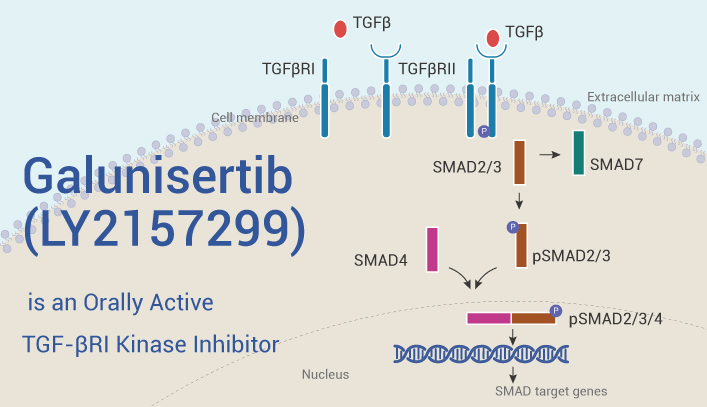TGFβ receptors are a class of one-way serine/threonine kinase receptors. They belong to the TGFβ receptor family. TGFβ is a growth factor and cytokine involved in paracrine signaling. Importantly, it is present in many different types of tissues, including the brain, heart, kidney, liver, bone, and testis, among others. Moreover, TGFβ plays an important role in many biological processes, such as cell proliferation, apoptosis, immune regulation, and tumorigenesis. Besides, there are several different isoforms of TGFβ receptors, which can be homodimers or heterodimers.
TGF-β1/Smads signal transduction pathway is the classic signaling pathway of TGF-β1. That is carried out through its type 1 and type 2 receptors. Firstly, TGF-β1 binds to the TGFBR2 receptor on the cell membrane after activation. Secondly, the type 1 receptor forms a heterologous complex with it on the cell membrane. Besides the type 1 receptor is phosphorylated and activated by the type 2 receptor kinase. Activated type 1 receptors temporarily bind to R-Smads and phosphorylate the C-terminal Ser residues of R-Smads. The activated R-Smads change conformation and dissociate from the receptor, and then combine with Co-Smad (Smad 4) to form a complex and transfer to the nucleus. The activated complex then binds to two types of DNA-binding cofactors, co-repressors or co-activators, respectively, to determine the transcriptional activity of the target gene.
Galunisertib (LY2157299) is an oral active TGF-βRI kinase inhibitor.

Galunisertib, also known as LY2157299, is an oral and selective TGF-β receptor type I (TGF-βRI) kinase inhibitor with an IC50 of 56 nM. In vitro studies, Galunisertib (LY2157299) (0.1, 1, 10, and 100 μM) displays a slight dose-dependent potentiation of Bay 43-9006 in SK-Sora, HepG2, and Hep3B cell lines but not in JHH6, SK-HEP1, and HuH7 cell lines. In in vivo studies, Human xenografts Calu6 (non-small cell lung cancer) and MX1 (breast cancer) are implanted subcutaneously in nude mice. After oral administration of 75 mg/kg, Galunisertib (LY2157299) induces a 70% decrease in pSmad for both types of cell lines. The time at which pSmad recovered 80% of the baseline is approximately 6 h after administration.
In conclusion, Galunisertib (LY2157299) is an orally active and selective TGF-β receptor type I (TGF-βRI) kinase inhibitor.
References:
[1] Lorea Bueno, et al. Eur J Cancer. 2008 Jan;44(1):142-50.
[2] Maria Serova, et al. Oncotarget. 2015 Aug 28;6(25):21614-27.